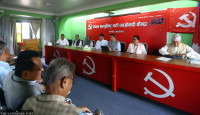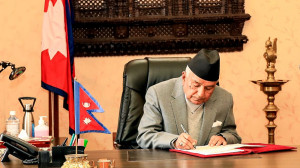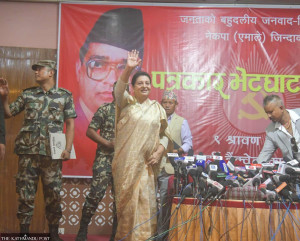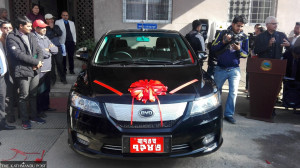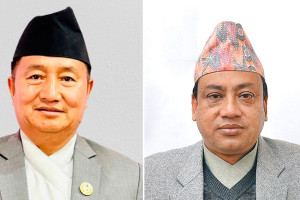Politics
Factionalism back in the UML with Bhandari’s return
Ruling party’s politburo endorses proposal to remove 70-year age and two-term limits for leadership positions.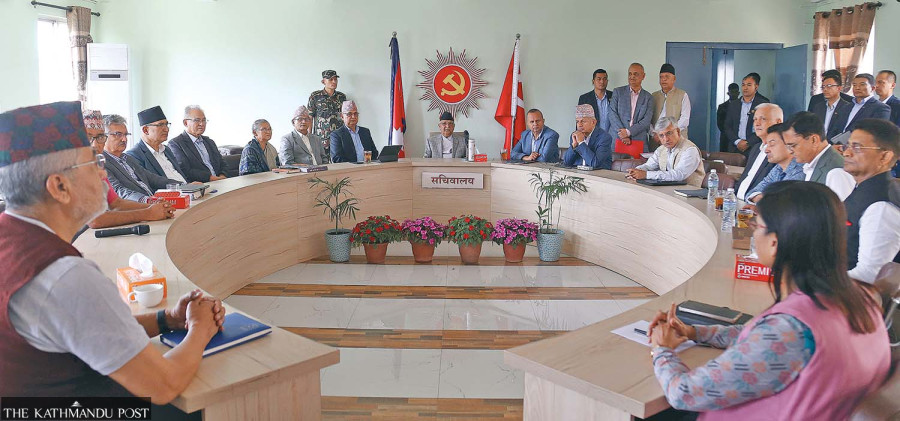
Purushottam Poudel
The CPN-UML, Nepal’s largest communist party, has witnessed the most vivid signs of a factional feud, nearly four years after KP Sharma Oli was elected to the top party position through the 10th general convention.
Senior party leaders have remained sharply divided during the party’s top committee meetings after former President Bidya Devi Bhandari, who announced she was rejoining the old party last month, expedited her activities apparently with a plan to challenge Oli’s leadership.
There was no powerful leader to challenge Oli in the party after a group of top leaders including two former prime ministers Madhav Kumar Nepal and Jhala Nath Khanal quit the UML and formed the CPN (Unified Socialist) in 2021.
The politburo meeting held on Friday and Saturday was meant to do preparatory works for the party’s second National Policy Convention scheduled for September 5-7.
It, however, exposed brewing tensions, with a clear split emerging over Bhandari’s return to active politics—and Oli’s unyielding leadership approach increasingly coming under fire from within.
Oli, who is also the prime minister, had until recently maintained that no form of factionalism would be tolerated within the party.
Referring to occasional tussles between second-tier leaders at the provincial or district levels, Oli had dismissed any notion of internal grouping. However, recent developments show that factional activities are again taking root in the party in a more serious way.
This time, the emerging rivalry is between Oli and Bhandari— who remained close allies for many years.
Some senior leaders, however, deny the existence of factionalism in the party.
“It is inappropriate to say that factional activities have taken root in the party simply because some members have expressed dissent,” said Karna Thapa, a standing committee member who actively supports Bhandari’s comeback in active politics.
On June 28, marking the birth anniversary of her late husband and UML ideologue Madan Bhandari, the former President publicly declared her return to active politics.
Bhandari at the event confirmed that she had renewed her membership of the party. “Now, I am reunited with the CPN-UML as a member of this family and I feel proud about it,” she said at the programme. She completed her second presidential term in March 2023.
However, at the politburo meeting on Friday, Chairman Oli claimed that Bhandari’s membership had not been renewed, clearly indicating his displeasure at her return to the party.
It appears Oli perceives her return to the party as a personal affront to his leadership.
Oli was elected UML chairman from the ninth general convention held in Kathmandu in 2014 and was re-elected to the post from the tenth convention held in Chitwan in 2021.
At the party’s recent secretariat and politburo meetings, UML leaders were divided over the proposal to revive the party statute’s suspended provisions regarding a 70-year age limit and a two-term cap.
Leaders close to Oli were clearly against the age and term limits while those supporting Bhandari were for implementing it.
The Oli faction prevailed and succeeded in dropping the provisions from both the secretariat and politburo meetings. However, these need to be endorsed by the central committee and the upcoming policy convention.
If the convention retains the 70-year limit and two-term provision, 74-year-old Oli cannot be a candidate for the party chief in the next general convention. It will directly benefit 64-year-old Bhandari, who returned to the UML apparently eyeing the party’s top post.
Oli aspires to lead the party for a third term.
Party vice-chair Bishnu Paudel, who was tasked by the secretariat with drafting the statute amendment proposal in view of the upcoming National Policy Convention, proposed dropping the age and term limits at the party secretariat meeting on Thursday.
Similarly, Paudel also proposed slashing the number of office bearers from 19 to 11. After a discussion, the party secretariat almost unanimously agreed to 15-member office bearers. However, the decision to scrap the age and term limits was made by a majority of the secretariat meeting.
The UML’s eighth general convention, held in 2009 in Butwal, introduced a two-term limit for leadership positions, while the ninth convention in Kathmandu set an age limit of 70. However, a secretariat meeting in June 2023 suspended the 70-year bar.
“Among the Secretariat members, senior vice-chair Ishwar Pokhrel, Yubaraj Gyawali and a few others registered dissent to the Secretariat’s majority decision on the 70-year age and two-term limits,” a party official said.
Both Pokhrel and Gyawali are currently considered close to Bhandari.
The two-day politburo meeting that concluded on Saturday endorsed the statute amendment proposal presented by the secretariat. The meeting also approved the proposal to scrap the position of senior vice-chair once the National Policy Convention is over.
The politburo meeting endorsed the statute amendment proposal, said Rajendra Gautam, chief of the party’s publicity department.
Gautam, while briefing the conclusions of the politburo meeting to the media, said that former President Bhandari’s party membership had not been renewed.
“The issue was discussed from various angles, but no conclusion has been reached yet. We will reach a decision later on,” Gautam said.
The politburo appeared divided over Bhandari’s re-entry into active politics. While some members called for an end to factionalism in her name, others demanded that Bhandari be given a formal position in the party.
There were some leaders who advocated a middle path. They suggested that Bhandari’s issue should be resolved directly between Oli and herself. Former minister Gokul Baskota was among those pushing for this approach.
“The relationship of trust and cooperation between the chairman and the former President is well known—not just to UML members but to the world,” Baskota reportedly told the meeting. “You two should sit together and resolve this politically through dialogue, not through technicalities.”
At the two-day meeting, some politburo members wanted no questions directed at the leadership when the party is under attack from external forces. Some members including Mahesh Basnet were of the view that questioning the leadership at this time would only weaken the party.
However, not all members buy the argument.
A politburo member from Lumbini Province claims that Oli himself has weakened the party. The party has been losing strength due to Oli’s style of leadership, inappropriate remarks, and ‘extreme’ political rhetoric.
“Even party cadres, who until recently chanted slogans in Oli’s favour, are now disillusioned with him,” the politburo member told the Post requesting anonymity. “The situation has deteriorated to the point where slogans were chanted against Oli at the Dasharath Stadium during a football tournament organised by the party’s sister wing.”
On the opening day of the meeting, Oli pitched that internal dissent should be avoided in such a critical situation.
Oli has been accused of running the party in an arbitrary and autocratic manner since the 2021 general convention. Political observers believe there are clear signals that the end of Oli’s monopoly in the party has begun.
Leftist commentator and professor of political science Krishna Pokhrel said that the faction seen to be opposing Oli still lacks the strength to get its ideas endorsed in the party.
Bhandari’s return to the party was expected to have a domino effect on the party’s politburo and other committee meetings, Pokhrel told the Post. “Such an impact remains to be seen. But it becomes increasingly clear that voices against Oli are unlikely to die down anytime soon.”




 22.39°C Kathmandu
22.39°C Kathmandu






